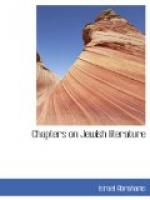In the latter year, Abarbanel was driven from Spain in the general expulsion instigated by the Inquisition. He found a temporary asylum in Naples, where he also received a state appointment. But he was soon forced to flee again, this time to Corfu. “My wife, my sons, and my books are far from me,” he wrote, “and I am left alone, a stranger in a strange land.” But his spirit was not crushed by these successive misfortunes. He continued to compile huge works at a very rapid rate. He was not destined, however, to end his life in obscurity. In 1503 he was given a diplomatic post in Venice, and he passed his remaining years in happiness and honor. He ended the splendid roll of famous Spanish Jews with a career peculiarly Spanish. He gave a final, striking example of that association of life with literature which of old characterized Jews, but which found its greatest and last home in Spain.
As a writer, Abarbanel has many faults. He is very verbose, and his mannerisms are provoking. Thus, he always introduces his commentaries with a long string of questions, which he then proceeds to answer. It was jokingly said of him that he made many sceptics, for not one in a score of his readers ever got beyond the questions to the answers. There is this truth in the sarcasm, that Abarbanel, despite his essential lucidity, is very hard to read. Though Abarbanel has obvious faults, his good qualities are equally tangible. No predecessor of Abarbanel came so near as he did to the modern ideal of a commentator on the Bible. Ibn Ezra was the father of the “Higher Criticism,” i.e. the attempt to explain the evolution of the text of Scripture. The Kimchis developed the strictly grammatical exposition of the Bible. But Abarbanel understood that, to explain the Bible, one must try to reproduce the atmosphere in which it was written; one must realize the ideas and the life of the times with which the narrative deals. His own practical state-craft stood him in good stead. He was able to form a conception of the politics of ancient Judea. His commentaries are works on the philosophy of history. His more formal philosophical works, such as his “Deeds of God” (Miphaloth Elohim), are of less value, they are borrowed in the main from Maimonides. In his Talmudical writings, notably his “Salvation of his Anointed” (Yeshuoth Meshicho), Abarbanel displays a lighter and more original touch than in his philosophical treatises. But his works on the Bible are his greatest literary achievement. Besides the merits already indicated, these books have another important excellence. He was the first Jew to make extensive use of Christian commentaries. He must be credited with the discovery that the study of the Bible may be unsectarian, and that all who hold the Bible in honor may join hands in elucidating it.




